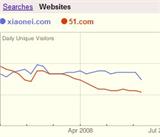New York Times: Media industry worries Google will become a strong rival - Age1983
An analysis article published in the New York Times today said that an increasing number of media companies are concerned about whether internet search giant Google will really transform into a media company, thereby becoming a powerful competitor to themselves. When you type "buttermilk pancakes" into Google, among the first three or four search results you can see detailed recipes and beautiful pictures of buttermilk pancakes provided by Google's website Knol. Google views Knol as a platform for experts to share knowledge in various fields, hoping to create an online encyclopedia with user-generated content. The popular Wikipedia uses a collaborative editing method for its content and does not display any advertisements, whereas contributors to Google's Knol can sign their names at the end of their articles, have the right to edit the content, and they can place advertisements provided by Google on the page.
Knol has only been around for three weeks and its fame is still not very high. However, some media companies have already begun to worry that Google will become their competitor. These media companies believe that in the future, Google will become a strong opponent, not only owning an increasing amount of content copyrights, including the world's most popular video sharing site YouTube and leading blog service Blogger, but also possessing the key to guiding web users.
Martha Stewart Living Omnimedia co-CEO Wenda Harris Millard said: "If Google really starts competing for revenue from its partners, then this will be a serious problem." Of course, the crux of the matter is monetary interest. If a website ranks lower in the search results page, then it will be difficult for the website to obtain enough traffic through the search engine channel. Due to fewer visitors, the website's advertising revenue will also decrease accordingly. In Google's search results, although Martha Stewart Company's buttermilk pancake recipe ranks lower than Knol's recipe, Ms. Millard believes that Google did not unfairly boost the ranking of its own Knol. But Ms. Millard indicated that Google's dual identity - search engine and content website - inevitably raises doubts. Ms. Millard said: "The question people have in mind is, as Google grows stronger in the content field, can it continue to remain impartial?"
Google has consistently stated that the company will absolutely maintain the objectivity of search result rankings. At the same time, Google has also indicated that it would treat its own Knol pages like other websites. Google spokesperson Gabriel Stricker said: "If you see Knol pages ranked higher, it means Knol deserves to be ranked higher." There is no evidence indicating that Google has tampered with Knol's ranking, and many Knol pages rank similarly in Google's search results as they do in Yahoo's. For instance, the buttermilk pancake recipe ranks fourth in Yahoo's search results.
Can Google keep its promise?
Google has always stated that it has no intention of creating or owning content, referring to itself as a friend of media companies, not an enemy. Google's search engine directs a large number of users to links on media company websites, and many media companies also rely on Google for advertising. Stricker said: "We will continue to be committed to being the best channel that connects users' search content with the results they expect. Therefore, we have no intention of owning or creating content."
Stricker emphasized that Knol is merely a platform for others to create and publish information, and Google's job is to integrate this information. He added that Google does not own the copyright of Knol's content, and the Knol website will not use Google's logo.
Knol is not Google's first "attack" on the content market. Prior to this, Google had already owned one of the most popular blog service sites, Blogger. This service digitizes millions of works and provides them to users via search services. Google also owns the Usenet online forum collection archive service. Additionally, Google's news service publishes news from major media outlets such as the Associated Press, and its financial service provides real-time stock market information. Of course, Google also owns one of the largest online media websites, YouTube.
Critics claim that every initiative by Google in the content field makes people more skeptical about whether Google can truly keep its promise of not being a media company. Mahalo CEO Jason Calacanis, whose search engine creates search result pages through editorial work, said: "Google claims they are not a content provider, but if they pay people and publish and archive the content provided by people, then the facts contradict what they say. In fact, they are already competing with content websites in terms of talent, advertisers, and users."
Knol has already been called a potential competitor to websites covering a wide range of content, such as Wikipedia, Mahalo, and About.com. When asked whether Knol would pose a threat to the New York Times Company's About.com, Martin A. Nisenholtz, Vice President of Digital Operations at the New York Times Company, said: "In the content provision market, About.com has a relatively solid position." Knol also competes with many websites providing single-content, such as WebMD which provides medical information, as well as other websites offering cooking and DIY guidance.
Objections within the media industry
Some online media companies have expressed that they are not worried about potential competition from Knol.
Demand Media CEO Richard Rosenblatt, who leads a rapidly rising online company, said: "As long as Google treats Knol equally with other websites, it is just another content-providing company." Demand Media owns eHow and ExpertVillage, which are websites providing instructional content. During the time when MySpace was acquired by News Corporation, Rosenblatt served as CEO of MySpace's parent company Intermix Media. Rosenblatt said that if Knol becomes a popular website, he would consider placing Demand Media's website content on Knol. Like many companies in the media sector, Demand Media also places many videos on YouTube. Rosenblatt said: "On YouTube, our video traffic is very high. This has not negatively impacted ExpertVillage."
Other media companies such as WebMD have already started publishing content on the Knol website. WebMD spokesperson Jennifer Newman said: "Our participation in Google's Knol is just a trial, similar to our previous collaborations with other companies. We hope to evaluate the effectiveness of this cooperation in enhancing WebMD's brand awareness."
However, Martha Stewart Company's CEO Ms. Millard said that she had considered publishing content on Knol but eventually abandoned the idea. She said: "If you do this, you will make their business grow bigger, which is not beneficial for your own business."
Mahalo CEO Calacanis said that as Google delves deeper into the content business, its dual identity may lead to controversies similar to those faced by Microsoft. Since Microsoft is both the provider of the operating system that other application software depends on and also a provider of application software. Calacanis believed that in some search result pages, Google could easily use its own YouTube, Knol, Blogger, and other websites to occupy three out of the top ten rankings. Although this does not mean that Google artificially boosts its own website's search ranking, it will inadvertently alienate Google's relationship with advertising partners, i.e., page content publishers.
Harvard Business School professor David B. Yoffie said that while Google promotes the success of other content providers, it obviously will not forget to enter this "high-value" content field. Professor Yoffie said: "If I were a content publisher and relied on Google to increase my website traffic, should I be worried that Google might become my competitor in the future? The answer is definitely yes."
Professor Yoffie said that Google's practices in search are fair, but if Google continues to enter the content field, it will encounter the same troubles that Microsoft faced over a decade ago. Professor Yoffie said: "The problems that Microsoft and its overall operation system faced in the 1990s may reappear between Google and its overall working system."



